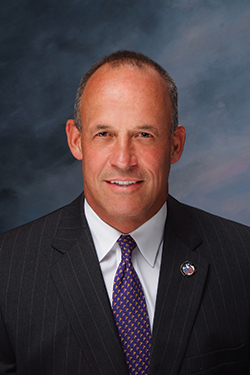The Gift of Public Servants

InterBusiness Issues is celebrating its 20th anniversary this year, and while this has been a tough year for everyone, one of the bright lights has been the upbeat tempo of this publication. iBi has been very generous in permitting guest articles from those of us in the public sector. In my final column for 2009, I want to begin by thanking Publisher Jan Wright and Managing Editor Jonathan Wright for the opportunity to discuss important matters of local public policy.
In selecting my topic for this issue, I have resisted the urge to write about the serious budget situation facing the City—and other governments, for that matter—and the fallout that impacts our employees and levels of service. So much has been written and spoken on deficits and related issues these past few months that I want to end the year on a high note. And that note is the “gift,” if you will, in our representative democracy of those people willing to serve in local public office. I cannot think of a year when this has been a more thankless responsibility.
I suppose that when you take your oath of office, it’s almost like making your marriage vows: when you commit yourself for better or worse, in sickness and health, for richer or poorer, to remaining faithful and committed. Locally elected officials have certainly felt their share of the “downside” of these vows this year, but they keep serving in a responsible and dedicated fashion. While I know firsthand what our City Council has gone through, and the very difficult decisions we have had to make, I am also conscious that every other unit of local government—and the people who serve on their boards of directors—have gone through the same stresses and challenges.
The City of Peoria’s 11 elected Council members (including the Mayor) serve approximately 112,000 to 114,000 citizens—which means that our per-capita ratio is over 10,000 “clients” each. In reality, of course, not all 10,000 will try to contact us at the same time, but the point is that local public servants are indeed on the cutting edge of representative government. You can attend any number of public meetings, speak your piece and voice your compliment or gripe, and in between, send letters, make phone calls and increasingly zap us emails. I can attest that all incoming communications are read and considered. No other level of government permits the citizenry to literally reach out and “touch” you in this manner. This is why I so greatly respect my colleagues on the Peoria City Council, and our peers elsewhere.
In visiting at statewide meetings or on the phone with my fellow mayors and village board presidents, I find that we share the similar feeling that in Illinois, we have an abundance of locally elected officials and units of government. On one hand, you could maintain that this is good, in that the citizenry has more direct access to local policy makers. No one can argue that they are left out. More concerning to me, however, is the fact that you can have too many different providers of local services competing for the same tax dollars, and that much of this is not coordinated among the units of government to give the citizenry the best “bang for the buck.” As I look forward to 2010 and the opportunity this column provides, I want to explore this notion of our overlapping governmental units a bit more.
For now, our fellow citizens are blessed with people willing to serve in locally elected offices—and who reap the joys and frustrations that come along with this privilege. In Peoria County, including the 18 members of the County Board and the 11 members of the Peoria City Council, there are 14 other incorporated communities with their own trustees or board members, and 20 townships with their own commissioners. We may differ from one another on development issues, infrastructure improvement priorities and quality assessments of our respective levels of service and attractions. But one thing is certain—the 183,433 people in Peoria County are well represented when it comes to matters affecting their daily lives.
Democracy thrives on the consent of those governed. At the local level, we demonstrate daily that this is truly the bedrock of our beliefs about why we serve our fellow citizens. I happen to believe that 2010 will be a better year for Peoria and all of central Illinois. A main reason for that is the “gift” of our local public servants. I am grateful for that. iBi

